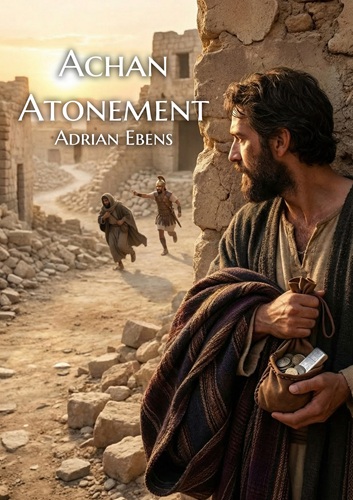Inspired Telling of the Cross - Christ and the Law
Originally Entitled: Christ and the Law Signs of the Times April 14, 1898
By the crucifixion of Christ the immutability of the law of God was forever established. Had it been possible, God would have changed His law to meet man in his fallen condition. But this law is unalterable, and the only way in which man could be saved was for a substitute to be provided, who would bear the penalty of transgression, and thus give man an opportunity of returning to his loyalty.
Charged with an embassage of mercy, love, and pardon, Christ came to His own. But His own received Him not. He was buffeted by temptation, and bruised and lacerated by the cruel lash. He was crowned with thorns, and crucified. His hands and feet were pierced by nails.
Behold the spectators who reviled Christ while He hung on the cross. Were they the abandoned class, the heathen, who knew not God? "They that passed by reviled Him, wagging their heads, and saying, Thou that destroyest the temple, and buildest it in three days, save thyself. If Thou be the Son of God, come down from the cross. Likewise also the chief priests mocking Him, with the scribes and elders, said, He saved others; Himself He can not save. If He be the King of Israel, let Him now come down from the cross, and we will believe Him. He trusted in God; let Him deliver Him now, if He will have Him; for He said, I am the Son of God."
Those that Christ had declared were whited sepulchers, who deceived the people by an outward appearance of sanctity, were now reviling One who came from heaven to save a perishing world, and in whose heart a zeal for right and justice and for the glory of God was the highest object. Those who chose Barabbas, thus yoking up with Satan, gave evidence that a profession of piety and of love for God, and a claim to know the Scriptures, neither made them the sons of God nor led them to represent His character. To those who had true religion, and there were such among the spectators, it must indeed have appeared as tho Satan were linked up with the men who were triumphantly shouting in blasphemy against the Commander of all heaven.
Obedience to every word that proceeds from the mouth of God is required. Had Christ conceded one jot or tittle of this, the hostility of Satan and his army would not have burst upon Him with irrepressible fury. He was able to perform marvelous works, and had He but given some license to sin, had He permitted evil passions to go unrebuked, men would have rendered Him their homage. But He rebuked all sin and hypocrisy, and men said, He is an impostor. The principalities and powers of darkness assembled round His cross. The arch apostate, still retaining his lofty stature, led the apostate host, who were leagued with human beings in the strife against God. When the Lord created these beings to stand before His throne, they were beautiful and glorious. Their loveliness and holiness were equal to their exalted station. They were enriched by the wisdom of God, and girded with the panoply of heaven. But who could recognize in the fallen angels the glorious seraphs that once ministered in the heavenly courts?
Satanic agencies confederated with evil men to lead the people to believe that Christ was the chief of sinners, and to make Him an object of detestation. But the priests and rulers failed to realize that in Christ divinity was enthroned in humanity. Christ's humanity could not be separated from His divinity. Could one sin have been found in Christ, the world would have plunged into blackness and ruin. If Satan could have so bruised Christ's heel that He would have yielded to the physical torture, his triumph would have been complete. He could have shouted victory. The world would have been his kingdom. But Satan could only cause pain. He could not touch Christ's head unless Christ proved false to God. Satan and his angels united with the priests and rulers in mocking and deriding the Son of God. He filled them with vile and loathsome speeches. He inspired their taunts. But by all this he gained nothing. He was permitted to bruise Christ's heel, but Christ was bruising his head. By working through the priests against Christ, Satan was effecting his own downfall.
Hanging on the cross, the Son of God bore the insults of His enemies. Heavenly angels were not far away. They heard the mocking taunts and saw the wagging heads. Gladly would they have broken their ranks and gone to the Son of God in His humiliation and bodily anguish; but they were not permitted to do this. It must be demonstrated before the universe what men will do when under the control of Satan. The insult, abuse, and mockery that Christ bore were part of God's great plan. The result of Satan's working through the professedly pious men must be shown.
As the prince of darkness inspired the Jewish priests to join the rebellion against God, so he will again inspire men. He will persuade them to apostatize from the service of God, and to use their religion as a weapon against their Creator. They may profess great zeal in God's service, but, poor souls, they are serving the prince of darkness, and as their general, Satan leads them.
"And about the ninth hour Jesus cried with a loud voice, saying, Eli, Eli, lama sabachthani?" The wrath of God fell upon Christ. This was the hiding of the Father's countenance. Tho innocent, Christ was treated as a sinner, that through His merits sinners, tho guilty, might be treated as the loyal and obedient children of God. Christ died with the sins of the world imputed to Him, that His righteousness might be imputed to the sinner. When the sense of the loss of His Father's favor was withdrawn, Christ had drained the last dregs in the cup of bitterness.
"Now there was set a vessel full of vinegar; and they filled a sponge with vinegar, and put it upon hyssop, and put it to His mouth. When Jesus therefore had received the vinegar, He said, It is finished." There was a shriek, shrill and agonizing, and the Son of God expired. He died of a broken heart. When the spear was thrust into His side, there flowed forth blood and water. His heart was broken by His mental agony. And the hearts of all who seek the Lord and find Him will be broken as they see the result of sin.
In His dying agony on the cross, Christ was scorned by the people who claimed to be waiting for the Messiah, but who showed by their actions the value of their spirituality. Surely Christ has borne our griefs and carried our sorrows. Surely he was wounded for our transgressions and bruised for our iniquities. But did not Satan understand that while He was bruising the heel of the Son of God, the Son of God was bruising his head? What great and wonderful effects have resulted from the crucifixion! What a view of the character of God, Christ's sacrifice has opened to the universe! His love for man, far surpassing all human love, has lifted the law of God to its own eternal dignity. The attributes of God have been revealed, and the holy requirements of His law have been vindicated. The effects of the sacrifice on the cross are still felt; but all who would be saved must themselves have an interest in the crucified One.
In His great suffering, Christ felt no pang of bitterness against His Father. He felt no remorse for His own sins, but for the sins of the fallen race. But those who refuse the gift of Christ will one day feel the sting of remorse. Entire obedience to the law of God is the condition of salvation. Those who refuse this, who refuse to accept Christ, will become embittered against God. When punished for transgression, they will feel despair and hatred. This will be the experience of all who do not enter into Christ's suffering; for it is the sure consequence of sin.
We read of chains of darkness for the transgressor of God's law. We read of the worm that dieth not, and of the fire that is not quenched. Thus is represented the experience of every one who has permitted himself to be grafted into the stock of Satan, who has cherished sinful attributes. When it is too late, he will see that sin is the transgression of God's law. He will realize that because of transgression, his soul is cut off from God, and that God's wrath abides on him. This is a fire unquenchable, and by it every unrepentant sinner will be destroyed. Satan strives constantly to lead men into sin, and he who is willing to be led, who refuses to forsake his sins, and despises forgiveness and grace, will suffer the result of his course.
By dying on the cross, Christ gave His life as an offering for sin, that through His power man might turn from his sins, be converted, and become a laborer together with God. Greater love than this can never be shown. More could not be done than has been done to demonstrate the immutability of God's law. Christ did not die to abolish the law or to detract in the slightest degree from its influence or power. He died to exalt the law and make it honorable. Full of goodness, compassion, and love, he hated only one thing, --sin, "the transgression of the law." In the very act of dying to save what was lost, Christ reached the perfect standard of obedience as our substitute and surety. "Forasmuch then as the children are partakers of flesh and blood, He also Himself likewise took part of the same; that through death He might destroy him that had the power of death, that is, the devil." No pang of anguish that Christ endured was in vain. Thus the ransom was paid for all who accept Christ as their personal Saviour. From the Word of God they receive their title to freedom. "Wherefore the rather, brethren, give diligence to make your calling and election sure; . . . for so an entrance shall be ministered unto you abundantly into the everlasting kingdom of our Lord and Saviour Jesus Christ."
Mrs. E. G. White. {ST, April 14, 1898 par. 14}





